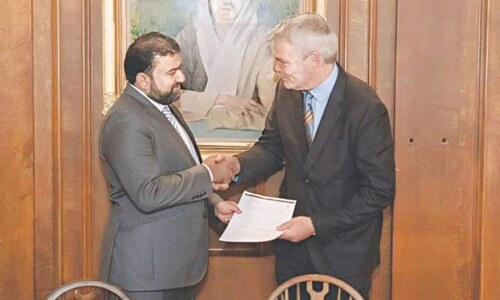PESHAWAR, Feb 11: Participants of a consultation on Saturday demanded a ‘clear constitutional status’ for the Federally Administered Tribal Areas (Fata) to protect the locals’ fundamental rights.
Majority of them declared the last year’s Frontier Crimes Regulation (FCR) amendments a cosmetic measure of the government and demanded large-scale administrative and political reforms in the region.
The consultation on ‘Reforms in FCR’ was organised by Human Rights Commission of Pakistan and was attended by lawyers, journalists, political and human rights activists, mostly from Fata.
Former HRCP chairwoman Asma Jehangir told participants that the country’s major policies, including those about Fata, were made by intelligence agencies or under the army’s influence.
She said unfortunately, people of Fata had been de-linked from those of the country’s other areas and that the Fata problem could not be taken in isolation as it was connected to that of Pakistan.
Ms Jehangir said unfortunately, some national institutions that should support strengthening of civilian setup had been siding with the establishment.
She said militarisation had increased in the country, including Fata.
“The constitutional status of Fata should clearly spell out if it is a province or an autonomous body,” she said, adding that as a first step, fundamental rights given to people of the country’s other parts should be extended to Fata residents, too.
Ms Jehangir suggested that either the superior courts’ jurisdiction be extended to Fata or a proper judicial forum be put in place there.
Parliamentary leader of Fata members in the National Assembly Munir Khan Orakzai said though FCR reforms were insufficient, amendments to the 110 years old regulation of the colonial era were commendable.
He said Fata people should support FCR amendments for strict enforcement, which would lead to more amendments to the law for public welfare.
Mr Orakzai said it was up to Fata people to decide if they wanted a separate province or an elected agency council with powers to legislate.
He regretted that policies about Fata were made in Islamabad by the military and political leadership without involving the representatives of the area.
HRCP vice chairman Sher Mohammad Khan shed light on the recent amendments to Frontier Crimes Regulation and its impact on the prevalent system.
Fata Lawyers Forum president Ijaz Mohmand said development in tribal areas was not possible without separation of the judiciary from the executive.
He criticised Frontier Crimes Regulation amendments and said the Fata Tribunal constituted under it consisted of two bureaucrats and a person who could be appointed judge to the high court and was well-versed in traditions of tribal areas. “In fact, this is no judicial forum,” he said.
Mr Ijaz cast doubts about enforcement of Fata reforms saying children below 16 years of age continued to be languishing in the area’s different ‘political lock-ups’.
Human Rights Commission of Pakistan director IA Rehman said Fata administration and the government enjoyed arbitrary powers under Frontier Crimes Regulation despite the last year’s amendments to it.
He said the administration could still impose collective fines on a tribe and crack down on an entire village for security reasons. He said the Fata Tribunal was like an executive forum not a judicial tribunal due to presence of two civil servants in it.Representative of Fata Lawyers Forum Kareem Mehsud said Article 247 of the Constitution discriminated against Fata people and therefore, it should be properly amended.
He said even after Frontier Crimes Regulation reforms, political agents continued to enjoy many undue powers, especially one about detention of people and group of people without citing any reason.
The chairman of International Relations Department, University of Peshawar, Dr Ijaz Khattak said people in Fata was were opposed to the existing administrative and political system as it was put in place by colonial rulers for a specific time and for specific purposes.
Director of University of Peshawar’s Areas Study Centre Dr Sarfraz said Fata people had been treated as subjects not citizens since the days of the Raj.
He said like the naming of the erstwhile Northern Western Frontier Province as Khyber Pakhtunkhwa through the 18th Constitutional Amendment, declaring Fata a province was an uphill task.








































Dear visitor, the comments section is undergoing an overhaul and will return soon.